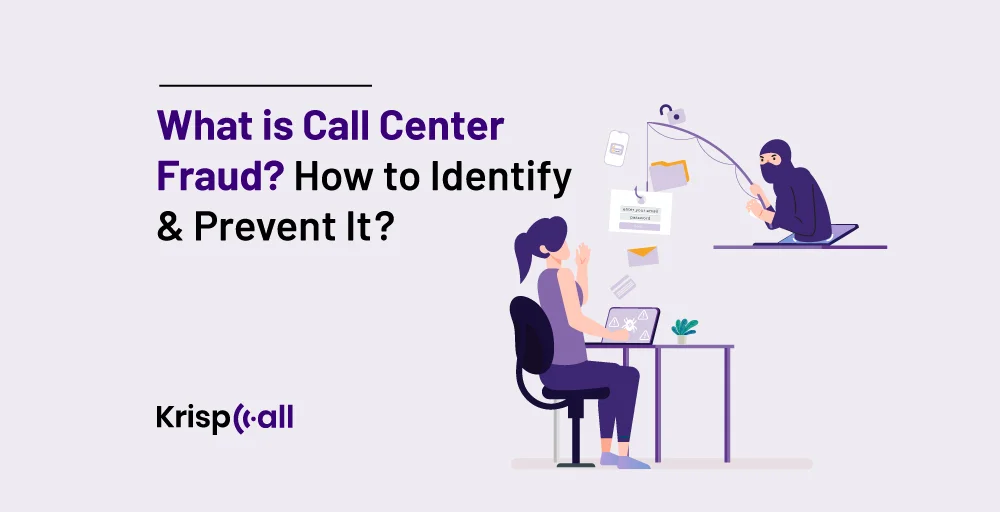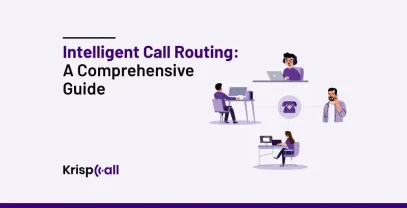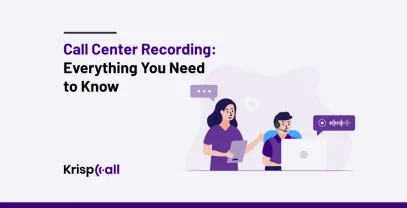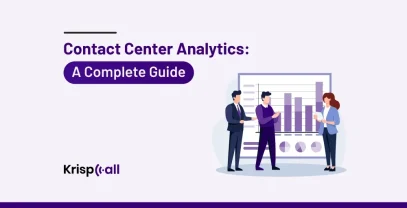While call centers offer a valuable service 🤩 to their customer, they also present a tempting target for fraudsters 😠.
No wonder fraudsters can impersonate a legitimate caller and gain access to personal and financial information. This eventually affects businesses in various ways, such as causing financial losses, a loss of reputation, and a loss of brand value. Therefore, identifying and preventing fraud is important 👍.
This guide will provide information on identifying call center fraud, how to prevent it, and its consequences for your business.
🔑 KEY HIGHLIGHTS
- Call center fraud is when an unknown person impersonates a legitimate caller and gains personal & valuable information.
- Five types of Call Center Fraud: account takeover, identity theft, card not present fraud, network jacks, and IVR fraud.
- Call center fraud can significantly damage your brand reputation and company value, causing financial loss and business interruption.
- To avoid call center fraud, train your employees to recognize fraudsters and enable two-factor authentication and knowledge base authentication (KBA) questions.
What is Call Center Fraud?
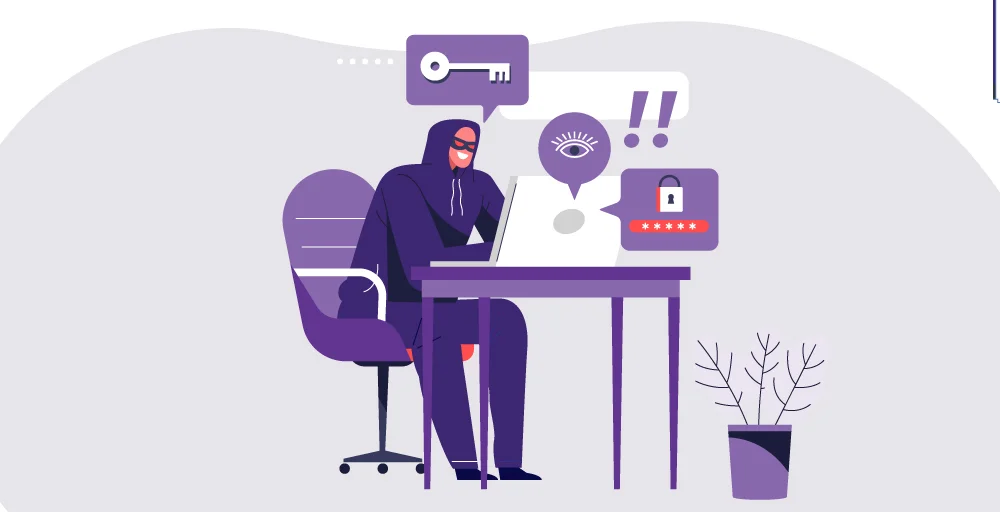
Call center fraud is when an unknown person contacts the call center with a fake identity to get control of other user’s personal data and account control. These hackers often provide false or thieved information such as an employee’s name, personal information, credit card information, and much more.
Call center fraud is the deliberate act of faking an identity during a phone call to gain access to other users’ or customers’ personal information. Fraudsters commonly contact using deceitful or pilfered data like a customer’s name, credit card number, or private information.
This issue can take various forms, including phishing and account takeover. Fraudsters aim to persuade call center staff to allow access to the real user’s or customer’s private data.
Why are Call Centers the Target Choice for Scammers?
Call centers are the target choice for scammers because call center staff handle a wide range of sensitive data, including customers’ financial and personal information. The scammer uses information in fraudulent activities such as identity robbery, financial fraud, and account takeovers.
Types of Call Center Fraud
Here are some common types of call center fraud ⬇️.
1. Account Takeover
Account takeover happens when a hacker successfully gets control of a user’s account and locks out the real user. Once the scammer gets access to the user account, they can control the account and change critical details. The scammer can also order products, transfer funds, or access sensitive data.
2. Identify Theft
It is an act of misusing and stealing someone’s personal (identity) information such as name, personal information, or credit card number. Scammers get information through unsecured wifi connections, unprotected computer devices, data breaches, and unknowingly shared information.
3. Card not present (CNP) fraud
CNP fraud happens when fraudsters use stolen credit/debit card information to make purchases without the physical card being present. Fraudsters simply need the name, card number, and PIN code to proceed with the transaction. Scammers avoid visually verifying their identity – due to the remote nature of the transaction.
4. Network Jacks
A fraudster can gain access to the call center via social engineering. After they get access, another device can connect to your network and access all your personal data. Your network has been compromised if you see new programs being installed or unknown programs requesting access.
5. IVR Fraud (IVR Mining)
Cyber attackers collect sensitive information via social media or data breaches. They will contact a call center and use IVR to confirm their acquired data. They collect confidential such as passwords, card numbers, or PINs. Once the fraudster gets the login credentials, they can easily take over your account and transfer unauthorized transactions.
Call Center Fraud Consequences
The consequences of call center fraud are ⬇️:
1. Financial damage and product loss
Successful call center fraud can cause companies to incur significant financial losses. They often suffer from loss of materials, products, and cash funds. The companies also have to compensate for the damage to their customers caused by the call center’s negligence.
2. Reputational damage
When a company suffers from fraud, it loses the trust of its affected customers and also the customers who hear about the incident. This is primarily true for companies that handle sensitive information, such as healthcare and financial institutions. A damaged reputation can potentially hinder a company’s future business opportunities.
3. Loss of company value
Loss of company value is a consequence of call center fraud, and fraudulent activities can damage a company. The fraud attack suggests potential issues with the company’s overall functionality, which may result in potential future financial setbacks. This can lower the company’s valuation.
4. Compromised data
When a hacker successfully gets access to a call center’s IVR system or private accounts. They can access user chat, send messages and emails, call records, and a fully detailed customer profile. Due to the stolen data, the call center’s customers may suffer further financial and reputational damage.
5. Business interruption
Business interruption is a significant consequence of call center fraud, which can disrupt both the normal operations and customer service of a company. The company must hire new employees to identify the source of the scam. After research, companies must notify all the affected customers, select the damage size, and revise customer interactions and compensation.
How can you Identify Call Center Fraud?
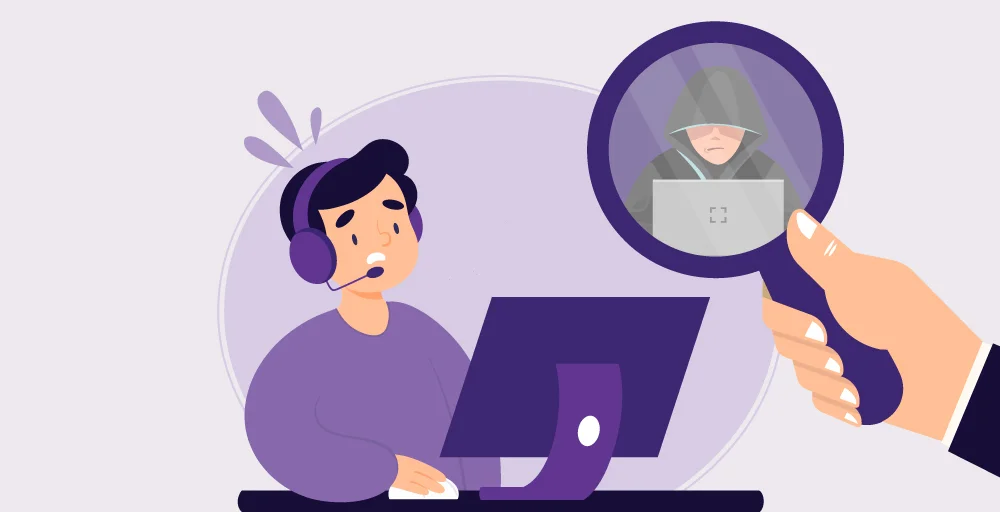
It can be challenging to identify call center fraud. To identify call center fraud, several key signs call center agents can monitor ⬇️:
- Difficulty with knowledge-based authentication (KBA): The quick way to identify the scammer is if they are struggling to answer KBA. Only a rightful owner can accurately answer the question you provided.
- Inability to complete authentication processes: Another easy way to identify scammers is if the caller can’t perform two-factor authentication. They may avoid voice biometrics, security queries, or facial identification processes.
- Avoidance of authentication procedures: If the caller tries to bypass authentication procedures or focus on establishing a connection with an agent. This kind of activity indicates a sign of fraud.
- History of failed login attempts: Another way to identify a fraud attempt is if the history shows several failed login attempts. This can be a sign of a fraud attempt.
- Mismatched information: You can also identify fraud when the profile information provided by callers does not match the customer profile. Further verification should taken to confirm their identity.
How can you Prevent Call Center Fraud?
Here are some tips to prevent call center fraud ⬇️:
- Educate your employees: You should teach them about fraud prevalence, how to identify it, and how to handle it. This could help them identify and prevent fraud.
- Ask probing questions to verify caller identity: The call center should improve its integration of strategic questions to confirm or verify the caller’s identity and ensure that the caller is the rightful owner of the account holder.
- Utilize multi-factor authentication (2FA): You can also use multi-factor authentication to verify of the user’s identity. This makes it harder for scammers to copy someone’s information and effectively integrate it with IVR systems.
- Utilize knowledge base authentication (KBA) questions: To prevent call center fraud, you can also use KBA questions. If they are unable to answer, then it’s easy for you to identify and prevent fraud.
- Monitor calls and transactions: There is another way to prevent fraud is to monitor calls and transactions in your call center. It makes it easy for you to identify any activity by keeping call tracks and transactions.
Conclusion
Call center fraud poses a significant threat to businesses and customers. In this scheme, hackers or scammers may impersonate legitimate callers, using stolen information to trick call center employees into divulging sensitive data.
This information can include credit card numbers, social security numbers, or login credentials. This can lead to huge damage to brand reputation, trust, value, and financial loss as they have to compensate for customers.
Therefore it is essential to prevent such fraud. Train your employees to identify them, enable two-factor authentication, and ask knowledge base authentication (KBA) questions. This helps you to identify scammers and prevent them from divulging sensitive information about customers.

